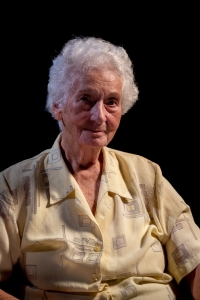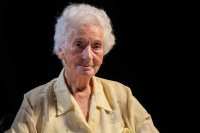Fortunately, we got into that world, which actually differed from the ordinary world

Stáhnout obrázek
Dagmar Horváthová, nee Papežová, was born on April 24, 1935 in Prague to Vladimír and Anna, nee Polákova. Despite the fact that the father was a Catholic, during the Second World War he was sent to a concentration camp earlier than the mother of Jewish origin. Dagmar also found herself in danger because of her racial origin, although she was baptized. The parents decided to hide their children with the Homolkova family, and Dagmar overnight became a little mother to her two-year-old brother Honzík. They returned to the children just before the end of the war, and the father subsequently participated in the Prague Uprising. The peaceful first post-war years ended in 1948 and the beginning of the construction of the socialist regime in Czechoslovakia, when the father was deposed from the position of general director of textile factories and was unemployed until 1962. After completing her studies, Dagmar got a job at the Institute of Nuclear Research, where she also met her future husband, Pavlo. After two years together in Prague, they moved to Bratislava, where Pavol came from, and Dagmar found employment at the Botanical Institute of the Slovak Academy of Sciences. At the time of the invasion of the Warsaw Pact troops in August 1968, the family with four children was staying in Dubna, Russia, where Pavol had been working since the end of 1967 at the Institute of Nuclear Research. Although they already tried to return to Bratislava at that time, due to the housing issue, they were only allowed to do so in 1972. Although she viewed the political coup in 1989 very positively, she mistakenly believed that that a democratized form of socialism will be established, he considers the division of the republic in 1993 to be a fatal failure of democracy due to the absent referendum when deciding on such a fundamental political issue.

